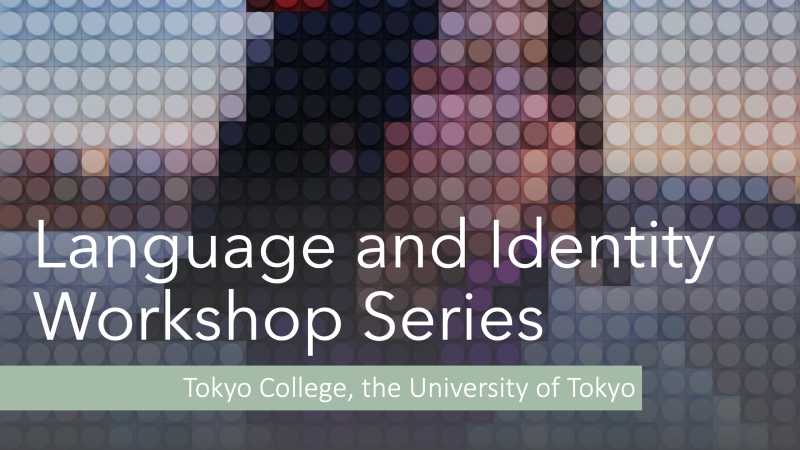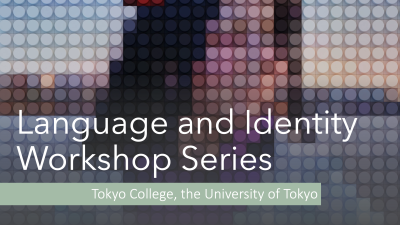Language and Identity Workshop VI. Language, Identity, and the Mind

| Date(s) | Tuesday, 18 July 2023, 17:00-18:30 JST |
|---|---|
| Venue |
Zoom Meeting (Register) |
| Registration | Pre-registration required |
| Language | English |
| Abstract |
Shiyi Sherry ZHA (Ph.D. Student, University of Leeds) Configuration of Home: Liu Na’ou’s experimentation with languages in transcribing senses and spatial experience Liu Na’ou, a writer who was born in colonial Taiwan in 1905 and received higher education in Tokyo from 1920 to 1926 at Aoyama College, could barely practice mandarin Chinese before he arrived in Shanghai in 1926. Yet, through translating works by Japanese writers into Chinese and practising non/fictional writings in Chinese, Liu left his name in the literature history as one of the most prominent writers of the Shanghai Neo-Sensation School. By close analysing how Liu experimented with languages in constructing the senses and spatial experience from phenomenology and psychoanalysis perspectives, the central impetus of this project aims to answer the question: what does home/homeland mean for Liu? In other words, what was Liu’s idea about his own identity as a diasporic writer? Through a combined anthropological, phenomenological and psychological lens, my project develops from the argument that an individual’s identity is intrinsically mediated, sculptured, transformed by embodied practices. Therefore, I identify home as something more than an authentic culture or pure sign; it is something cavernous and amorphous, like an unidentifiable belonging or a formless longing, that threatens to the original idea of birthplace and blood-related family. Ultimately, this paper explores how embodied experiences are transcribed through language, representing a way of knowing and questing in the early 20th century Japan and China.
Stefanie SIEBENHÜTTER (Research Fellow, Johannes Gutenberg University Mainz and Waseda University) Identity among multilingual speakers from a multidisciplinary perspective: Why multilingual language use is not well described with multilingual identity and why multilinguals do not become multiple identities Considering approaches to define identity in various disciplines (sociology, psychology, philosophy, social psychology, and linguistics), this multidisciplinary approach visualizes why the identity of multilingual speakers cannot be described adequately with the term “multilingual identity”. It is argued, that terminological confusion of “core personality”, “self-conception”, or “partial, fluid, hybrid, and multiple identities” results from equating identity with social roles or language. In psychology, severe identity disorders, characterized by almost no coherent self-image or sense of identity (identity confusion, crisis, diffusion, fragmentation) used to be pathological, became widely treated as normal. However, identity does not equal social role, linguistic code, or language proficiency, nor are ethnicity or nationality necessarily related to self-concept and identity. ‘National language’, and ‘mother tongue’ (first language/s) do not allow for conclusions about a person’s or a group’s Equating language and identity leads to “L1 and L2 identity separation” or “identity erasure” despite existing evidence that adding L2 or L3/L4 does not lead to a split personality, ‘linguistic schizophrenia’. Identity is constructed by more than by language(s) an individual is proficient in and sometimes as the findings of this study suggest the concept of identity is to define even without language. Therefore, even excellent L2 acquisition cannot lead to “identity erasure” or partial identities. Instead of equating identity with language, the multilingual profile of individuals may influence their self-concept. As a conclusion a guideline to identity research based on empirical sociolinguistic data is provided.
Zsuzsa DURAY (Research Fellow, Hungarian Research Center for Linguistics) and Zsuzsa VÁRNAI (Research Fellow, Hungarian Research Center for Linguistics) The role of language in indigenous identities in Arctic communities ”If you don’t speak the language, you’re excluded. You’re a tough one, so to say.” This paper presents the project “Minority languages in the process of urbanization: A comparative study of urban multilingualism in Arctic indigenous communities” (NKFIH-11246) and gives an overview of the results. The aim of the project is to investigate linguistic and cultural identity among North-Uralic minorities in urban settings and to explore the ways minority members engage in multilingual urban communities and adapt to multilingual contexts. We concentrate on the situation in three northern urban settlements, home to indigenous North-Uralic peoples in Russia (Khanty Mansiysk and Dudinka) and in Finland (Enontekiö). According to our hypothesis, due to various cultural and linguistic traditions and circumstances, it is not the heritage language that is the primary component of ethnic identity in each and every indigenous minority community in our study. In this paper we seek to address the following question: To what extent is language perceived by the participants as a prominent aspect of their ethnic identity with regard to non-linguistic expressions of their ethnicity, including traditional ways of life, traditional territory and contacts with their heritage community? This paper also presents the volume ‘Mosaics of ethnic identity’ investigating linguistic and cultural identity among North-Uralic minorities in urban settings and ways of adapting to multilingual contexts.
Laur KIIK (Postdoctoral Fellow, The University of Tokyo) Talking Nationalism in Kachin, Burma How do words shape nationalist worldviews? People in Burma (Myanmar) have lived amid competing nationalisms and suffered from ethno-nationally based military repression and wars since the Second World War. Understanding such ethno-national movements on their own terms – through their own words and languages – helps understand why these identity struggles have become so important to so many people. After several decades of ethno-political war, how have Burma’s ethnic Kachin people’s own-language terms for identity, territory, and revolution interacted with people’s identities, emotions, worldviews, and future visions? How do the Kachin concepts compare with neighboring Bamar, Tai (Shan), and Chinese concepts? Drawing on ethnographic fieldwork among Kachin people since 2010 and a basic etymological study, this paper discusses a few keywords that appear most often in everyday political talk, such as nation, country, and liberation. Such Kachin concepts anchor both popular identities and people’s affective engagements with politics, as well as sensitive debates around identity, for example, about Kachin internal cultural variation and the region’s inter-ethnic relations. |
| Program |
17:00-17:20 (15 min. talk + 5 min. Q&A)
17:20-17:40 (15 min. talk + 5 min. Q&A)
17:40-18:00 (15 min. talk + 5 min. Q&A)
18:00-18:20 (15 min. talk + 5 min. Q&A)
18:20-18:30 |
| Speaker Profile |
Presenters Shiyi Sherry ZHA
Stefanie SIEBENHÜTTER
Zsuzsa DURAY
Laur KIIK
Moderator Maria TELEGINA |
| Organized by | Tokyo College, The University of Tokyo |
| Contact | tokyo.college.event@tc.u-tokyo.ac.jp |













